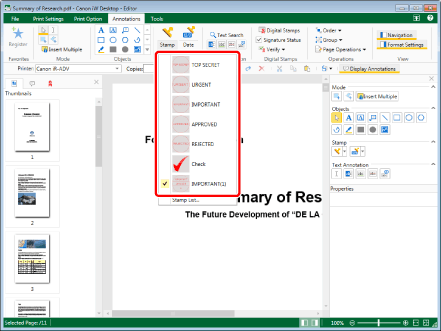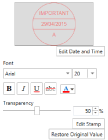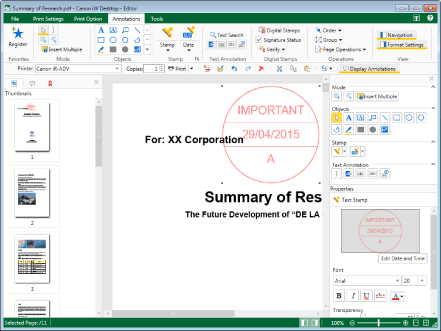Inserting Text Stamps
With Desktop Editor, you can insert fixed text into a document as an annotation.
|
NOTE
|
|
You can insert newly registered text stamps, as well as the text stamps that are registered automatically during installation. For more information, see the following.
|
1.
Click  for
for  (Stamp) on the ribbon, and select the text stamp to insert.
(Stamp) on the ribbon, and select the text stamp to insert.
 for
for  (Stamp) on the ribbon, and select the text stamp to insert.
(Stamp) on the ribbon, and select the text stamp to insert.Or, click  for
for  (Stamp) on the Details Window, and select the text stamp to insert.
(Stamp) on the Details Window, and select the text stamp to insert.

The preview and properties of the selected text stamp are displayed on the Details Window.
|
NOTE
|
|
The last stamp used can be selected by performing one of the following operations.
Click
 for for  (Stamp) on the ribbon (Stamp) on the ribbonClick
If the Details Window is not displayed, see the following.
This operation can also be performed with the tool buttons on the toolbar. If tool buttons are not displayed in the toolbar of Desktop Editor, see the following to display them.
When you want to insert text stamps multiple times, double-click
Perform one of the following operations to cancel the button selection.
Click
Click another button on the Details Window
Click a command on the ribbon
Press the [Esc] key on the keyboard.
You can click
 (Insert Multiple) on the ribbon to insert multiple stamps. For more information, see the following. (Insert Multiple) on the ribbon to insert multiple stamps. For more information, see the following. |
2.
Configure the properties of the text stamp.

|
[Edit Date and Time]
|
If you click this, the [Edit Date and Time] dialog box is displayed. You can edit the date display format in the [Edit Date and Time] dialog box. For more information, see the following.
|
|
[Font]
|
Configure the font of text stamps.
|
|
[Font]
|
Select the font to use from the list displayed when you click
|
|
[Font Size]
|
Select the font size to use from the list displayed when you click
|
|
[Bold]
|
Makes the string bold.
|
|
[Italic]
|
Makes the string italic.
|
|
[Underline]
|
Underlines the string.
|
|
[Strikethrough]
|
Adds a strikethrough to the string.
|
|
[Font Color]
|
Select the stamp color you want to use from the list displayed when you click
|
|
[Transparency]
|
The slider position and the numeric value (%) indicate the degree of transparency of the text stamp. To change the degree of transparency, move the slider to left or right, or enter a numeric value. You can specify the degree of transparency in units of 1% by using
|
|
[Edit Stamp]
|
If you click this, the [Edit Stamp] dialog box is displayed and you can change the properties of the stamp. For information on the properties you can set, see the following.
|
|
[Restore Original Value]
|
Restores the changed stamp properties to the values set when the stamp was registered. This is only valid before inserting a stamp.
|
|
NOTE
|
|
The current settings are previewed in the top section of the properties.
If date information is not inserted in the text stamp, [Edit Date and Time] cannot be clicked.
If you select [More Colors] in [Font Color], the [Color] dialog box is displayed and you can set a color that is not listed in [Font Color].
You can also configure the properties of the annotation with the following commands.
 (Edit Date/Time) (Edit Date/Time) (Font) (Font) (Font Size) (Font Size) (Bold) (Bold) (Italic) (Italic) (Underline) (Underline) (Strikethrough) (Strikethrough) (Font Color) (Font Color) (Transparency) (Transparency) (Edit Stamp) (Edit Stamp) (Restore Original) (Restore Original)If commands are not displayed on the ribbon of Desktop Editor, see the following to display them.
This operation can also be performed with the tool buttons on the toolbar. If tool buttons are not displayed on the toolbar of Desktop Editor, see the following to display them.
|
3.
Move the mouse pointer to the Work Window.
The shape of mouse pointer becomes  , and then a preview of the selected text stamp is displayed.
, and then a preview of the selected text stamp is displayed.
|
NOTE
|
|
To cancel the insertion process, do one of the following.
Click
 (Select Object) on the ribbon (Select Object) on the ribbonClick
 (Select Text) on the ribbon (Select Text) on the ribbonClick
 (Grab Mode) on the ribbon (Grab Mode) on the ribbonClick
 for for  (Stamp) on the ribbon (Stamp) on the ribbonClick
Click
Click
Click
Press the [Esc] key on the keyboard
|
4.
Set the preview where you want to insert a text stamp, and click it.

The stamp is inserted.
|
NOTE
|
|
If the edge of the text stamp exceeds the edge of the page, the position of the text stamp is automatically moved to fit in the page.
To adjust the size of the inserted text stamp, change the font size on the Details Window.
|
5.
Click on the Work Window outside the stamp you inserted to deselect the stamp.
|
NOTE
|
|
To change an inserted stamp, select the inserted stamp and perform one of the following operations.
Change the properties in the Details Window
Change the stamp properties in the [Edit Stamp] dialog box displayed by clicking
 (Edit Stamp) on the ribbon or [Edit Stamp] on the Details Window (Edit Stamp) on the ribbon or [Edit Stamp] on the Details WindowIf commands are not displayed on the ribbon of Desktop Editor, see the following to display them.
This operation can also be performed with the tool buttons on the toolbar. If tool buttons are not displayed on the toolbar of Desktop Editor, see the following to display them.
Stamps registered by users can be edited. For more information, see the following.
|